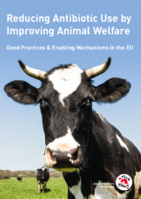
Reducing Antibiotic Use by Improving Animal Welfare
FOUR PAWS guidance report
By 2050, antimicrobial resistance could cause 10 million deaths each year and bring economic losses comparable to the 2008 financial crisis if no action is taken – warns the World Health Organization. Antimicrobial resistance (AMR) is one of the greatest threats to global human health, and intensive animal agriculture, accounting for over 70% of the worldwide use of antimicrobials, drives this silent pandemic.
To address this challenge, the European Commission adopted new legislation that imposes new restrictions for the use of antibiotics in the farming sector and prohibits antibiotic use to compensate for poor hygiene, inadequate animal husbandry, lack of care, or poor farm management.
Reducing antibiotics in agriculture
In light of the developments at EU level, FOUR PAWS, together with veterinary and legal experts, has created this guidance document to support decision-makers in implementing the necessary measures for improving animal welfare on European farms in order to reduce the use of antibiotics, tackle AMR, and align with the new EU regulations.
A significant reduction in the use of antibiotics in agriculture is urgently needed and is possible only if we address the root causes that make antibiotic treatments necessary: the husbandry conditions of animals and the sheer size of industrial farming.
On intensive farms, antibiotics are heavily administered to curtail sickness in animals living in conditions in which diseases spread easily. Providing high welfare will ensure that the animals are in good health and their immune systems are strong, making them less prone to infections that require antibiotic treatment. This is the way forward to effectively decrease the use of antibiotics.
At the same time, transitioning to high animal welfare farming can only happen along with a transition to sustainable, predominantly plant-based diets that lift the pressure of intensive agriculture off our environment and are critical for mitigating the climate crisis. In the end, to safeguard human health, we need to rethink and remedy the relationship between humans, animals, and the environment.


